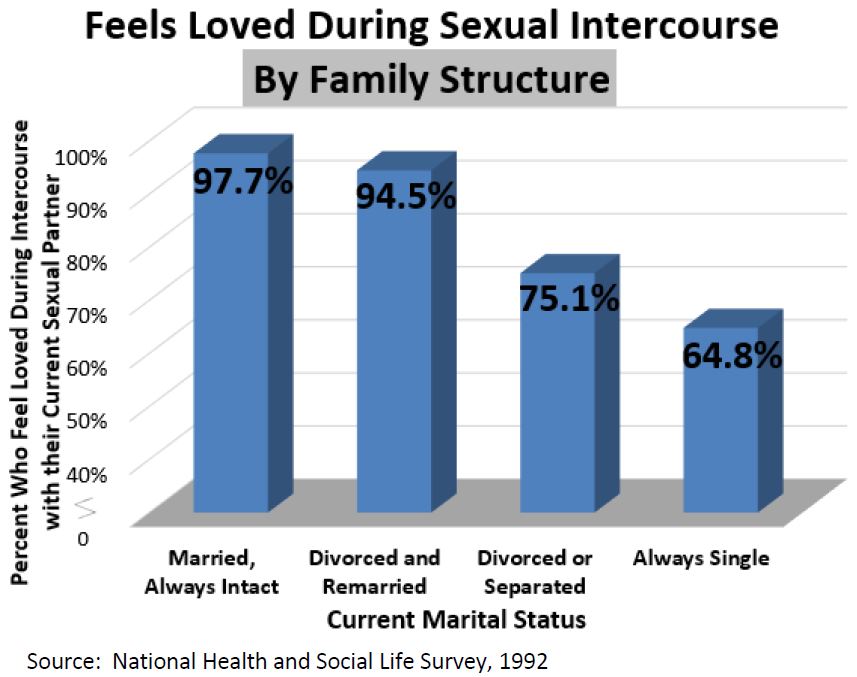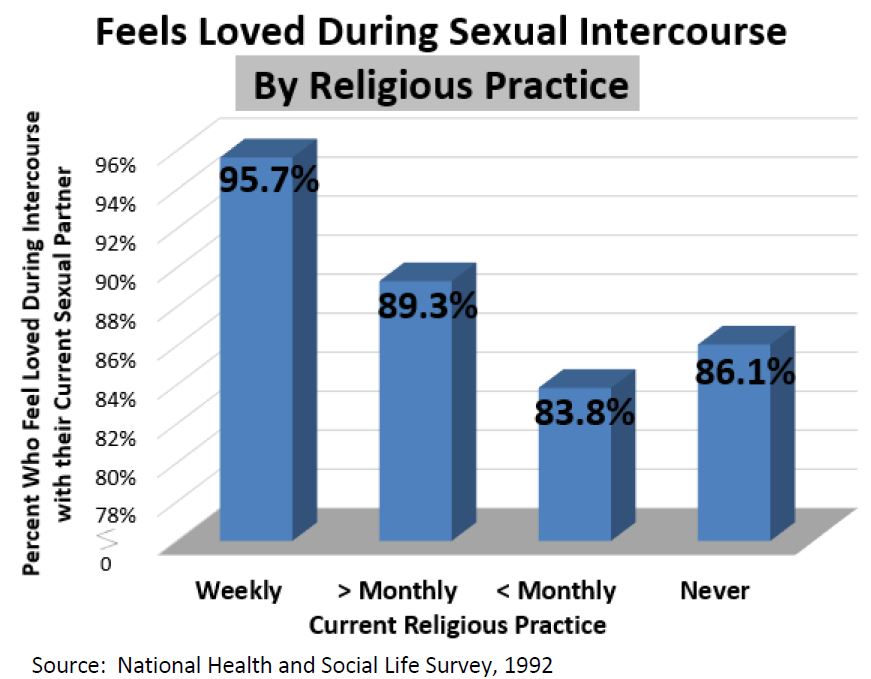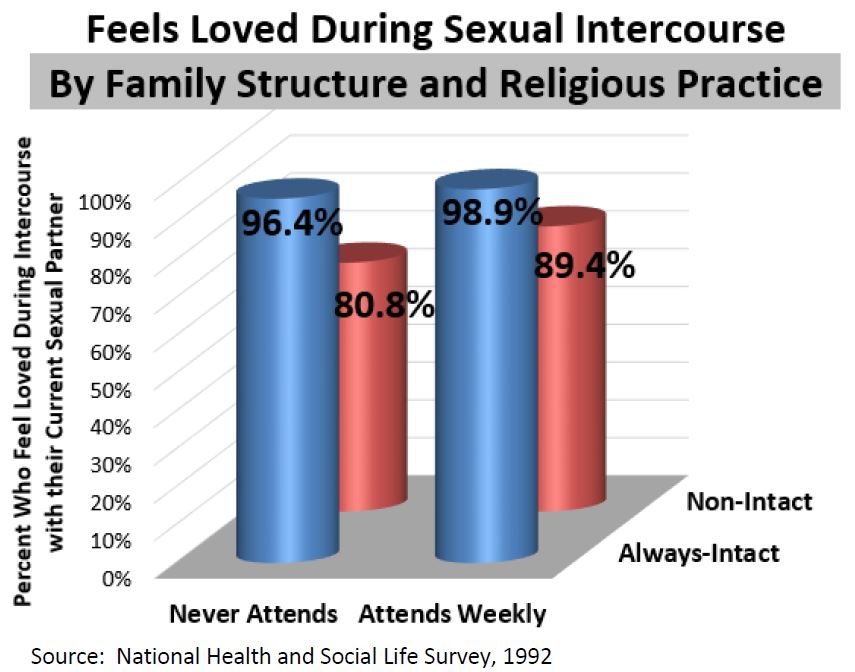Click Here to download “Feels Loved During Sexual Intercourse by Family Structure and Religious Practice”
Feels Loved During Sexual Intercourse by Family Structure and Religious Practice
Adults aged 18 to 59 in intact marriages who worshiped weekly at the time of the survey were most likely to report feeling loved during intercourse with their current sexual partner, according to the National Health and Social Life Survey (1992), the most detailed analysis of sexual behavior in America.
[1]
Family Structure: Those in always-intact marriages were most likely to report feeling loved during intercourse (97.7 percent). Feeling loved decreases among those in non-intact family structures and singles: 94.5 percent of those who were divorced and remarried reported feeling loved during intercourse; 75.1 percent of those who were divorced or separated reported feeling loved; and 64.8 percent of those who were always single reported feeling loved during intercourse.
 Religious Practice:
Religious Practice: Those who worshiped weekly at the time of the survey were most likely to report feeling loved during intercourse with their current sexual partner (95.7 percent), followed by those who worshiped less than weekly but at least monthly (89.3 percent), those who never worshiped (86.1 percent), and those who worshiped less than monthly (83.8 percent).
 Family Structure and Religious Practice Combined:
Family Structure and Religious Practice Combined: Those in intact marriages who worshiped weekly were most likely to report feeling loved during intercourse (98.9 percent). Those in intact marriages who never worshiped (96.4 percent), those in non-intact family structures or who were single who worshiped weekly (89.4 percent), and those in non-intact family structures or who were single who never worshiped (80.8 percent) were less likely to feel loved during intercourse with their current sexual partner.
 Related Insights from Other Studies:
Related Insights from Other Studies: Even individuals engaged in premarital sex place high value on the importance of feeling loved and needed by their partner, as one survey of 249 college students found.
[2] A study that examined the proposition that love promotes commitment in relationships found that the experience and display of love was correlated with actions taken to build commitment within a relationship, such as constructive conflict resolution during times when the relationship was threatened.
[3] Delaying commencement of sexual relations until marriage further promoted feelings of commitment for couples. Another study of 2,035 married participants found that only 16 percent of couples waited until marriage to have sex. However, of those participants who did wait, 22 percent rated the stability of their marriage higher and their satisfaction with the relationship was 20 percent higher than the couples who did not wait.
[4]
[1] These charts draw on data collected by the 1992 National Health and Social Life Survey
[2] Janell Lucille Carroll, Kari Doray Volk, and Janet Shibley Hyde, “Differences Between Males and Females in Motives for Engaging in Sexual Intercourse,”
Journal of Sexual Behavior 14, no. 2 (1985): 131-139.
[3] Gian Gonzaga, Dacher Keltner, Esme Londahl, and Michael Smith, “Love and the Commitment Problem in Romantic Relations and Friendship,”
Journal of Personality and Social Psychology 18, no. 2 (August 2001): 247-262.
[4] Dean Busby, Jason Carroll, and Brian Willoughby, “Compatibility or Restraint? The Effects of Sexual Timing on Marriage Relationships,”
Journal of Family Psychology 24, no. 6 (December 2010): 766-774.]]>
 Religious Practice: Those who worshiped weekly at the time of the survey were most likely to report feeling loved during intercourse with their current sexual partner (95.7 percent), followed by those who worshiped less than weekly but at least monthly (89.3 percent), those who never worshiped (86.1 percent), and those who worshiped less than monthly (83.8 percent).
Religious Practice: Those who worshiped weekly at the time of the survey were most likely to report feeling loved during intercourse with their current sexual partner (95.7 percent), followed by those who worshiped less than weekly but at least monthly (89.3 percent), those who never worshiped (86.1 percent), and those who worshiped less than monthly (83.8 percent).
 Family Structure and Religious Practice Combined: Those in intact marriages who worshiped weekly were most likely to report feeling loved during intercourse (98.9 percent). Those in intact marriages who never worshiped (96.4 percent), those in non-intact family structures or who were single who worshiped weekly (89.4 percent), and those in non-intact family structures or who were single who never worshiped (80.8 percent) were less likely to feel loved during intercourse with their current sexual partner.
Family Structure and Religious Practice Combined: Those in intact marriages who worshiped weekly were most likely to report feeling loved during intercourse (98.9 percent). Those in intact marriages who never worshiped (96.4 percent), those in non-intact family structures or who were single who worshiped weekly (89.4 percent), and those in non-intact family structures or who were single who never worshiped (80.8 percent) were less likely to feel loved during intercourse with their current sexual partner.
 Related Insights from Other Studies: Even individuals engaged in premarital sex place high value on the importance of feeling loved and needed by their partner, as one survey of 249 college students found.[2] A study that examined the proposition that love promotes commitment in relationships found that the experience and display of love was correlated with actions taken to build commitment within a relationship, such as constructive conflict resolution during times when the relationship was threatened.[3] Delaying commencement of sexual relations until marriage further promoted feelings of commitment for couples. Another study of 2,035 married participants found that only 16 percent of couples waited until marriage to have sex. However, of those participants who did wait, 22 percent rated the stability of their marriage higher and their satisfaction with the relationship was 20 percent higher than the couples who did not wait.[4]
[1] These charts draw on data collected by the 1992 National Health and Social Life Survey
[2] Janell Lucille Carroll, Kari Doray Volk, and Janet Shibley Hyde, “Differences Between Males and Females in Motives for Engaging in Sexual Intercourse,” Journal of Sexual Behavior 14, no. 2 (1985): 131-139.
[3] Gian Gonzaga, Dacher Keltner, Esme Londahl, and Michael Smith, “Love and the Commitment Problem in Romantic Relations and Friendship,” Journal of Personality and Social Psychology 18, no. 2 (August 2001): 247-262.
[4] Dean Busby, Jason Carroll, and Brian Willoughby, “Compatibility or Restraint? The Effects of Sexual Timing on Marriage Relationships,” Journal of Family Psychology 24, no. 6 (December 2010): 766-774.]]>
Related Insights from Other Studies: Even individuals engaged in premarital sex place high value on the importance of feeling loved and needed by their partner, as one survey of 249 college students found.[2] A study that examined the proposition that love promotes commitment in relationships found that the experience and display of love was correlated with actions taken to build commitment within a relationship, such as constructive conflict resolution during times when the relationship was threatened.[3] Delaying commencement of sexual relations until marriage further promoted feelings of commitment for couples. Another study of 2,035 married participants found that only 16 percent of couples waited until marriage to have sex. However, of those participants who did wait, 22 percent rated the stability of their marriage higher and their satisfaction with the relationship was 20 percent higher than the couples who did not wait.[4]
[1] These charts draw on data collected by the 1992 National Health and Social Life Survey
[2] Janell Lucille Carroll, Kari Doray Volk, and Janet Shibley Hyde, “Differences Between Males and Females in Motives for Engaging in Sexual Intercourse,” Journal of Sexual Behavior 14, no. 2 (1985): 131-139.
[3] Gian Gonzaga, Dacher Keltner, Esme Londahl, and Michael Smith, “Love and the Commitment Problem in Romantic Relations and Friendship,” Journal of Personality and Social Psychology 18, no. 2 (August 2001): 247-262.
[4] Dean Busby, Jason Carroll, and Brian Willoughby, “Compatibility or Restraint? The Effects of Sexual Timing on Marriage Relationships,” Journal of Family Psychology 24, no. 6 (December 2010): 766-774.]]>
